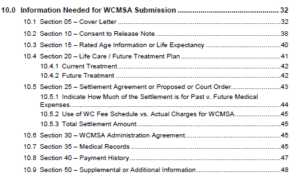B. Josh Pettingill
The Centers for Medicare and Medicaid Services (CMS) approval of a Medicare Set-Aside is a voluntary process but getting CMS approval has become the standard practice when resolving catastrophic workers’ compensation cases with Medicare eligible, injured workers. There are countless ways that an approval can be delayed. If any of the following items are missing or not accurate within the submission, the case can be “developed” which in laymen’s terms means investigated and further delayed.[1]

However, the most common reasons we see firsthand as to why there are interruptions with CMS approval are the following:
- Line items in the report were either not priced correctly, and/or omitted purposely or inadvertently by the employer/carrier’s MSP compliance expert;
- The most recent medical records or payouts were not included with the submission;
- The MSA was submitted as a “lump sum” allocation when it should have been submitted as an “annuity funded” allocation.
It is vital to have your own MSA expert review any proposed MSA allocations by the defendant and have the option to prepare an independent WCMSA analysis or medical cost projection. That way, you can be certain that the MSA is an accurate reflection of the future medical costs for purposes of negotiations, as well as ensure expedited CMS approval of the MSA. Furthermore, all MSAs should be submitted as an annuity funded MSA. If CMS approves a different amount, whether it be lower or higher, you have the correct parameters for funding the MSA.
[1] https://www.cms.gov/Medicare/Coordination-of-Benefits-and-Recovery/Workers-Compensation-Medicare-Set-Aside-Arrangements/Downloads/WCMSA-Reference-Guide-Version-2_8.pdf

